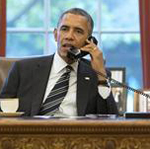 Wall Street Journal: The next six months will likely determine whether the crisis over Iran’s nuclear program can be resolved peacefully, as global powers conduct intensive talks with Tehran aimed at ensuring it can’t produce atomic weapons.
Wall Street Journal: The next six months will likely determine whether the crisis over Iran’s nuclear program can be resolved peacefully, as global powers conduct intensive talks with Tehran aimed at ensuring it can’t produce atomic weapons.
The Wall Street Journal
By Jay Solomon

WASHINGTON—The next six months will likely determine whether the crisis over Iran’s nuclear program can be resolved peacefully, as global powers conduct intensive talks with Tehran aimed at ensuring it can’t produce atomic weapons.
U.S. and European diplomats have identified several vital issues to be negotiated following the interim deal Iran reached over its nuclear program with the five permanent members of the United Nations and Germany in late November.
One is Iran’s development of a heavy-water nuclear reactor near the city of Arak. Tehran says it needs the facility to produce isotopes used in medical and industrial pursuits, but American officials are skeptical. Iran, they say, has numerous other facilities capable of producing these isotopes.
The negotiators will also seek to reduce Iran’s capacity to produce nuclear fuel through the enrichment of uranium. Iran has installed nearly 20,000 centrifuges and amassed enough low-enriched uranium to produce three to four nuclear weapons, if the material is processed further to weapons grade, U.S. officials say.
Iran has said it plans to construct new enrichment facilities in addition to the two it has in the cities of Natanz and Qom, though Iranian diplomats acknowledge their government will have to curtail those plans. But few analysts expect Tehran to completely dismantle its production facilities, as demanded by some U.S. Congress members and vital U.S. allies like Israel and Saudi Arabia.
“It remains uncertain if Iran recognizes the extent that it will have to roll back its infrastructure to reach a deal,” said Robert Einhorn, a senior fellow at Washington’s Brookings Institution who studies proliferation issues.
Another potentially divisive issue will be allegations made by the U.N.’s nuclear watchdog, the International Atomic Energy Agency, that Iran has conducted research to develop nuclear weapons and long-range missiles to deliver them.
Iran denies the agency’s charges and hasn’t given the agency’s inspectors access to the scientists allegedly involved and to the suspected development sites.
The success or failure of diplomacy with the Islamist government will help determine whether the Obama administration can implement its broader goals in the Middle East, such as ending the sectarian conflicts in Syria and Iraq and forging an Arab-Israeli peace accord. American and European officials hope a comprehensive deal on Tehran’s nuclear program will contain nuclear proliferation and herald cooperation with Iran on these other areas.
But Iran’s support for political movements and militant groups across the region gives it the ability to frustrate these U.S. initiatives. And deep suspicions persist between the two sides.
“If we manage to settle the nuclear issue, we can then move forward,” said Ali Ahani, Iran’s ambassador to France, at a conference last month in Monaco. “We constantly believe that it is in our interest in solving these crises. We can try and play our part in stabilizing the region.”
November’s interim deal calls for Tehran to freeze for six months parts of the most advanced parts nuclear program, including the production of near weapons-grade fuel, in exchange for an easing of Western economic sanctions.
However, the accord is already proving fragile. Iranian negotiators briefly walked out of discussions with the P5+1 in early December after the U.S. imposed sanctions on nearly a dozen Iranian firms it alleged were covertly aiding Tehran’s nuclear program. The U.S. Congress, meanwhile, aims to impose new economic sanctions on Tehran that Iranian diplomats said would end the talks.
U.S. and European officials said Iran would have to make a convincing accounting of its suspected weapons work, which it denies. But these officials were concerned that the Iranian diplomats involved in the talks may be unaware of this work. They say that Iran’s weapons programs are strictly run by Tehran’s elite military unit, the Islamic Revolutionary Guard Corps, which has voiced opposition to the current diplomacy.


